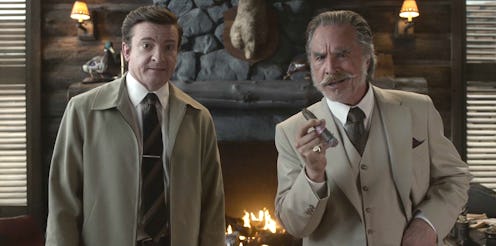
The joy of adapting a book series into a television show instead of a movie is that the episodes can not only incorporate all of the details of the books, but even expand on them. And when it came to the relationship between Charles and Sir in A Series of Unfortunate Events, the Netflix series helped clear up something that some book readers had only assumed up to this point. While it still wasn't explicitly stated in Season 1 of A Series of Unfortunate Events, it was everything but, and the series majorly implied that Charles and Sir are not just business partners — they are romantic partners. By defining this relationship, the Netflix series not only featured a gay couple in a series for children — something that is still all too rare — but also added LGBTQ representation to an adaptation of a preexisting story.
While you could criticize the fact that narrator Lemony Snicket didn't come right out and say that Sir and Charles are gay, the approach of the Netflix show matched the tone of the books. In Daniel Handler's series, readers might have figured that Charles and Sir were romantically involved by them constantly being referred to as each other's "partner." But unlike in the books, Lemony in Netflix's version helped define the word "partner" — and thus, helped define Charles and Sir's relationship.
When Violet, Klaus, and Sunny were introduced to Charles' partner Sir in Episode 7, "The Miserable Mill: Part 1," Sir said that he was the boss and that even his partner Charles had to do what he said. Klaus questioned the meaning of the word "partner" at this point, so Lemony Snicket stepped in to provide some clarification.
"Well, in fact, 'partners' can mean several things. It could mean 'two people who own a lumbermill together, or a cupcakery,'" Lemony said. "Now, with the advent of more progressive cultural mores, not to mention certain high court rulings, it could also mean ..."
That's when Sir said, "I do all the work. He irons my clothes." And Charles piped in, "I also cook your omelets!" Snicket then said, "the definitions are not mutually exclusive.
This dynamic of this relationship is exactly the same as in the book The Miserable Mill — even down to the details of Charles being responsible for ironing Sir's clothes and cooking his omelets. While these duties could just be an indication that Sir is the more dominant partner, these domestic duties are evidence that their relationship goes beyond their professional roles at Lucky Smells Lumbermill. And Lemony's reference to "certain high court rulings" proved that, since it can be assumed that he was speaking of the U.S. Supreme Court ruling in June 2015 that said gay marriage is a constitutional right in all 50 states. Even Charles saying he wants to give the children a "loving, normative home" seemed to be alluding to how same-sex parents have been shown to be just as competent as opposite-sex parents.
The actors also were able to provide more apparent hints about Charles and Sir's relationship. For example, the eye contact between Don Johnson's Sir and Rhys Darby's Charles when Klaus asked them about the meaning of "partner" was priceless. (I also must note how I thoroughly enjoyed the casting of the '80s sex symbol Johnson from Miami Vice and the hilariously bumbling Darby from Flight of the Conchords for these roles.) Then, in a moment when the pair thought they were alone (Violet was hiding behind the door), Charles leaned in, indicating that he was hoping for a kiss from Sir that he depressingly didn't get.
The diversity of the cast of Netflix's A Series of Unfortunate Events had proven before the show even premiered that it was going to be more inclusive. By making it clear that Sir and Charles are romantically linked, the series also included the LGBTQ community, which a writer for The Advocate praised the show for. While the roles aren't the most flattering, since Sir is pretty much a villain, Charles is a good — if naive — man. Plus, all of the adults in A Series of Unfortunate Events have their flaws.
The series choosing to make it fairly explicit that Charles and Sir are gay was one small step in helping to normalize same-sex couples in the entertainment industry and showed that, just like straight characters, gay characters are capable of being good, evil, and everything in between.